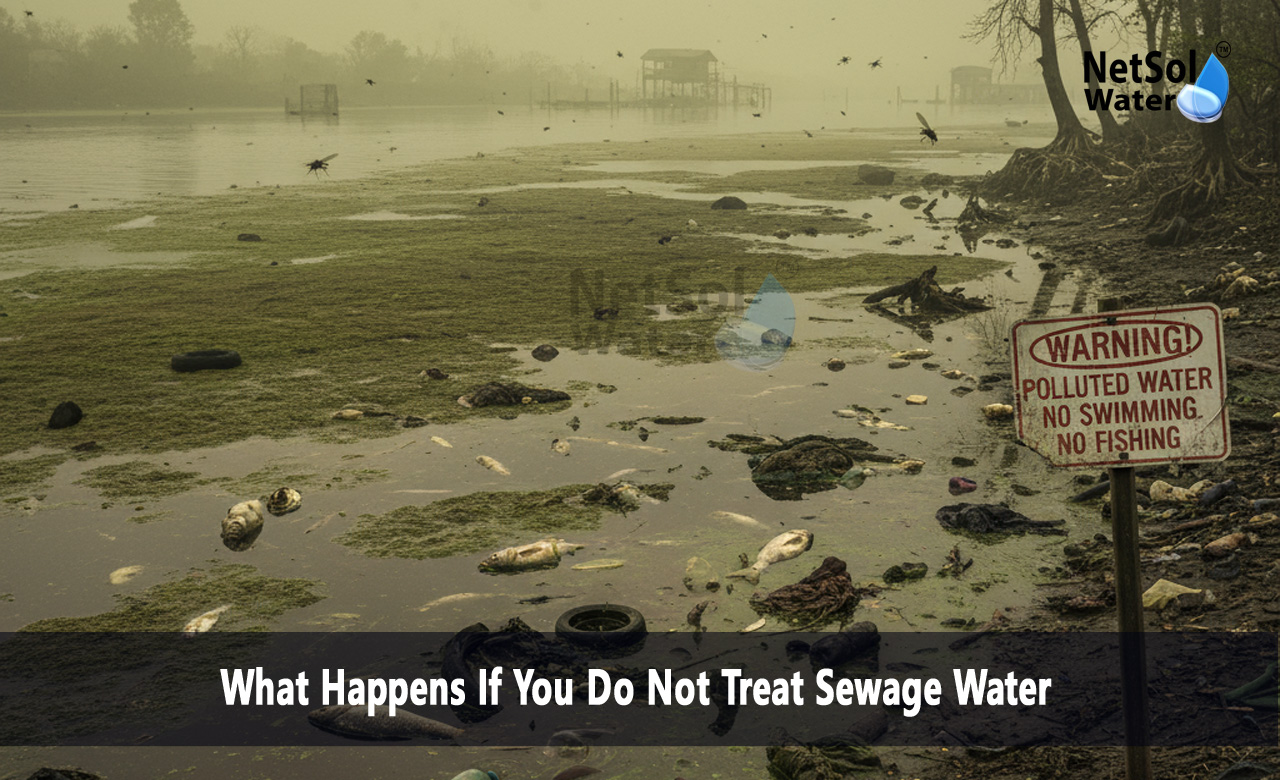What Happens If You Don’t Treat Sewage Water?
What Happens If You Don’t Treat Sewage Water is a question that affects every person and every place. Sewage water carries used water from homes and factories. It contains germs, chemicals and organic matter. If people leave this water untreated it can harm health and harm the land and water around us.
Health Risks
Health stands first when we think about untreated sewage water. Dirty water spreads disease and it affects children, elders and workers most. Let us have a look on some health threats and how they start.
Waterborne Illnesses
Untreated sewage water carries bacteria, viruses and parasites. These agents move from water into people who drink or touch the water. People can develop diarrhoea, cholera, hepatitis and skin infections. Local clinics see more cases when water systems fail. Quick action can cut these outbreaks.
Read: Sewage Treatment Plant Manufacturer
Long-Term Public Health Problems
Repeated exposure to polluted water weakens community health. Pregnant women face higher risks. Children can suffer from chronic stomach problems and poor growth. These harms lower school attendance and reduce life quality. Communities must expect slow steady harm if sewage water stays untreated.
Environmental Damage
Protecting nature matters for food, clean air and future life. Sewage water that reaches rivers, lakes and soil changes how these systems work. Let us have a look on some key ways nature suffers and how one effect flows into the next.
Damage to Rivers and Lakes
Sewage water feeds excess nutrients into rivers and lakes. Algae grow fast and block sunlight. Fish and plants die when oxygen falls. This change breaks the balance in water bodies. Local fisheries and tourism lose value when water looks and smells bad.
Soil and Groundwater Effects
When sewage soaks into soil it changes soil life and chemistry. Plants may absorb harmful chemicals and people may eat crops that contain unsafe residues. Groundwater that people use for wells can become unsafe. Cleaning a polluted aquifer costs time and money.
Economic and Infrastructure Impact
Money matters in every community. Untreated sewage water raises repair bills and lowers property value. Let us have a look on some economic drains and how they spread through a town or city.
Cost of Health Care and Lost Work
Outbreaks raise health care needs and cause workers to miss days of work. Businesses lose income when staff stay home. Families spend more on medicine and care. These costs reduce household savings and slow local growth.
Damage to Buildings and Roads
Sewage that sits or flows where it should not causes erosion and corrosion. Pipes and roads break faster. Repair projects need heavy equipment and skilled labour. Governments face higher overheads when sewage reaches public spaces.
Social and Community Consequences
Community life depends on clean shared spaces. Untreated sewage water changes how people live and how they move and how they see their town. Let us have a look on some social effects and how they alter daily life.
Loss of Public Comfort and Safety
When water smells and looks bad people avoid parks beaches and playgrounds. Children lose safe places to play. Outdoor markets lose customers. This change reduces social contact and harms mental health.
Inequality and Human Rights
Poor areas often face the worst sewage problems. When services fail these people face higher health and safety risks. This gap grows over years and it reduces chance for fair learning work and healthy life. Addressing sewage helps fairness.
Legal and Regulatory Consequences
Laws set basic rules that protect people and land. Failure to treat sewage water leads to fines loss of permits and legal action. Let us have a look on some legal outcomes and why rules matter.
Fines and Penalties
Authorities enforce rules on wastewater release. Businesses and utilities face fines when they break those rules. These penalties add to repair costs and harm reputation.
Long Term Compliance Costs
After a legal finding, governments require upgrades and monitoring. These projects add new costs and require skilled staff. Planning and investment reduce future risks and lower long term costs.
Conclusion
Failing to act on sewage water harms health, nature, money and social life. This blog shows how one problem leads to many more problems in a town or region. Clean water systems protect people and help the local economy grow. If you want help or more information contact us for a consultation. We can review your situation and propose steps to treat sewage water and protect your community.
Contact Netsol Water at:
Phone: +91-9650608473, Email: enquiry@netsolwater.com



